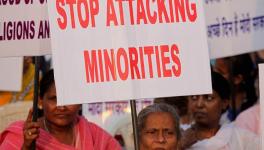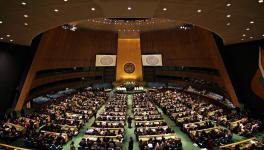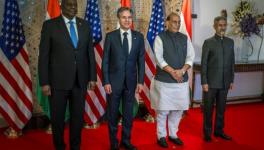Internet Governance and ITU: Issues Before Baku and Dubai
There are two forthcoming international events that have created a huge debate on who will control the Internet in the future.
These events are the 8th Internet Governance Forum (IGF) to be held in Baku from November 6th-9th and the World Conference on International Telecommunications (WCIT) which will meet from 3-14 December, 2012 in Dubai. While IGF brings all the players including civil society on a common platform, it has no binding powers to make any changes to the way internet functions. WCIT, on the other hand is part of ITU’s treaty making process and can – through modifying the International Telecom Regulations (ITRs) -- change the way that the internet functions today and therefore who will control the internet.
The Internet started as a means of sharing information amongst scientist working in different institutions. From that, it is becoming – if not already become --the communications backbone of the world. It is a major economic driver, provides banking and other financial services to world’s business, provides a global market place and is replacing the conventional print and visual media. Internet is now ubiquitous in today’s world. Cutting off an enterprise or a country from the internet would have severe consequences.
This of course immediately also brings out the dangers that are emerging in such an interconnected world. The Internet can be used to bring down the telecommunications network of different countries, its banks and even its’ power grid. In Iran, we have seen the use of cyber weapons by the US and Israel taking out physically 10,000 centrifuges. If this had been done using a missile, it would have been considered an act of war. How should we then look at the Internet – also as a strategic space which then country’s need to protect?
The global media runs on advertisements today; even for newspapers, the ad revenue is the bulk of their earnings. What is happening is that in the on-line world, the ad revenues are even more skewed – Google has about 50% of the total online ad revenue. In the future, Google, Facebook, and a few more global Internet companies can hog the major part of the global ad revenues. What happens then to the developing countries media? How do local content and local language-based media then survive?
Therefore, internet governance is not just about how it runs today. It is how it should be run that any country does not use it to attack others; or damage its economy; or use it to become the pre-eminent economic force on the internet. And let us not forget that url’s and domains are virtual real estate that are being bought and sold – they are of economic value. If internet is vital global resource, its governance is legitimately the concern of the global community.
This brings up two questions – who controls the internet now and is there any need to fix the net as it is functioning, the old engineering argument that “don’t fix what ain’t broke”.
Who then controls the internet today? This is not as straight forward a question as it seems. One part of internet governance is domain name and IP allocations. Domain names are what we type into url’s for locating various sites. They in essence are cyber real estates. Earlier, we had the .com, net and .org addresses, later on, the country addresses such as .in or .uk. All these addresses are converted into numbers as IP addresses which the computers can understand and this is done by root servers that “dissolve” the addresses we type into the address bars on our browser to the actual numeric addresses. The domain allocation is done by non-profit organisation registered in the US called ICANN. Of the 13 root servers, 10 are located in the US, 2 in Europe and 1 in Japan.
While for the world, ICANN controls the domain name allocation and therefore internet governance, they hold it under a contract from the US Department of Commerce, which is periodically tendered to only US entities. The current contract is till 2015. Therefore, the US still legally controls the domain name and ip address allocation – the entire internet domains --function through a legal contract with the US Department of Commerce. The US also controls the rootzone file through again the US Department of Commerce and can theoretically remove, for example .ir (Iran) out of it cutting off all Iranian domains from the internet. While this is not a likely scenario, as it would strengthen the argument of removing US from such a position of control, the fact that the US has this power over the internet is hugely problematic.
The other part of the Internet is the technical standards, the various ways that bits and pieces of technology fit together to make the internet run seamlessly. This is done by various technical bodies creating technical standards that everybody then follows, such that to the user everything is one seamless world-wide web The Internet Society is the key technical body for this purpose. The reality of the world is of course that this is again highly skewed with major corporations and experts, mostly from these corporations setting the standards and protocols that make the internet work. There is very little argument of putting this under multi-lateral control.
While the Internet Governance Forum was created earlier under UN aegis as a multi-stakeholder platform, it does not have any binding powers and works through consensus in changing the way things are run. It is the fear of ITU and the possibility of internet coming under some kind of multilateral governmental control that has also made IGF more important – it can be mobilised to argue that internet governance does not require multilateral agencies but only multi-stakeholders.
The International Telecom Union (ITU) as a body that runs the telecommunications networks of the world have an obvious interest on the internet issues – after all the internet runs on the basic telecommunications infrastructure. The telecom companies have tried in various ways to generate more income out of internet services, but have generally not succeeded as content and the telecommunications layers have been separate. There are three issues that are of concern – internet charges levied by telecom companies, differentiating between various kinds of content and lastly the ability by states to censor the net. The battle in Dubai over IT Regulations or ITR’s is about some of these issues.
Apart from these issues that are of concern to the users are issues that are of importance to nation states. These pertain to cyber security and use of internet to attack other countries – use of cyber weapons.
Various proposals have been circulating for some time in the ITU. The most debated have been that circulated by European Telecom Network Operators (ETNO), who have been arguing that networks sending packets should pay the networks which receive these packets – a variant of the calling party pays that is used in voice networks. With European government not backing these proposals, at the moment these proposals are dead unless picked up by any country.
However, there is one proposal that ETNO has made that has been picked up by India in its draft proposal. This pertains to differentiating different forms of content – that packets from say YouTube would be given preferential treatment by telecom companies over others. This runs against the concept of net neutrality by which powerful players should not be able to get preferential treatment on the net but will be treated like any other player. Undoubtedly this will help the telecom companies and players such as Google and Facebook but not the rest.
Apart from this, the Arab countries have made proposals which in effect ask that countries should not attack each others facilities using the internet. This is something that Russia and China have also raised. This is of vital importance as cyber weapons have been used against Iran and constitute a major expansion in the arena of war. While the US may have felt that it is today ahead of others and therefore banning of cyber weapons will take away their military advantage, what they forget is that such an edge cannot continue indefinitely. Global vital resources are vulnerable in a way that very few people understand. Any attempt to extend weapons and war to internet has enormous dangers for every country including the US. The Flame virus that took out the 10,000 centrifuges is estimated to have cost about $100 million. This is chicken-feed for a nation state. If we consider internet to be vital infrastructure today, a declaration to this effect in ITU would have enormous significance.
India government in its draft proposal has supported this stand. Unfortunately, a number of organisations – either through ignorance or under US lobbying – are confusing a declaration of this nature with physical verification of such a declaration. The chemical weapons treaty had no verification procedure, and yet chemical weapons were not used in the Second World War even by Nazi Germany.
Cyber security is of importance but fears that such measures will lead to censoring content may or may not be well-founded. Measures such as co-operation between multi-lateral agencies are needed to control fraud and provide security; demanding that all originating addresses be delivered to the end-network may not. So we will have to see each measure as it is being formulated instead of taking blanket opposition to ITU entering this area. The World Summit in Tunis, 2005 did make cyber security ITU’s mandate and we have to see how this is carried out without damaging the democratic content of the net.
The key issue is not one of what measures are adopted in Dubai. It is ITU’s entry into internet that is being opposed. It brings the fear of multi-lateral governance of the internet from its current structure of multi-stake holder governance under the “benign” aegis of the US. Here we have to ask as Hamadoun Touré, secretary-general of ITU asks, “When an invention becomes used by billions across the world, it no longer remains the sole property of one nation, however powerful that nation might be. There should be a mechanism where many countries have an opportunity to have a say. I think that’s democratic. Do you think that’s democratic?”
Image Courtesy: flickr.com
Get the latest reports & analysis with people's perspective on Protests, movements & deep analytical videos, discussions of the current affairs in your Telegram app. Subscribe to NewsClick's Telegram channel & get Real-Time updates on stories, as they get published on our website.
























